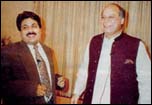The Rediff Interview/ Nawaz Sharief
'The people's mandate is to have a dialogue with India'
 After studying law Nawaz Sharief started looking after his
vast business interests spread all over Pakistan. His tryst with politics came in 1981
when President Zia-ul Haq appointed him finance minister of
Punjab. It did not take Sharief long to learn the intricacies
of politics. In 1985 he was elected to Pakistan's national assembly from
Punjab on the Muslim League ticket and soon became the youngest
chief minister of the province.
After studying law Nawaz Sharief started looking after his
vast business interests spread all over Pakistan. His tryst with politics came in 1981
when President Zia-ul Haq appointed him finance minister of
Punjab. It did not take Sharief long to learn the intricacies
of politics. In 1985 he was elected to Pakistan's national assembly from
Punjab on the Muslim League ticket and soon became the youngest
chief minister of the province.
He was soon entangled in a battle with Benazir Bhutto, and their rivalry took a new turn when he challenged Benazir and her Pakistan People's Party and
took a nine party coalition to victory in the 1990 election.
Two-and-a-half years later, President Ghulam
Ishaq Khan dismissed his government in April 1993. In the subsequent
election Benazir Bhutto won and was re-elected prime minister.
Those were very trying times for Nawaz Sharief,
but he continued his opposition against the incompetence and corruption
of the Bhutto regime. Pakistani politics witnessed renewed upheaval
and President Farooq Leghari finally dismissed
the Bhutto government in November 1996.
In February, Nawaz Sharief returned to power with
an unprecedented majority. Rajiv Shukla interviewed Pakistan's prime minister in Islamabad. An eloquent and fascinating conversation.
Ever since you resumed office as prime minister,
people in India and Pakistan are very hopeful that you would
do something to improve Indo-Pak relations. Has there
has been some progress?
There is hope and I feel this hope is not
only in Pakistan but in both the countries. We had declared our policy before the elections
that we would like to solve all our
issues with India including Jammu & Kashmir through dialogue.
We won the elections and since then have made efforts. The first meeting
was in Delhi followed by Islamabad. The two prime ministers met, I have found
Gujralsaheb a very nice person. I hope he will respond positively
and a nice rapport will be formed between the us.
If this is how you feel, when do you expect a breakthrough?
Nothing can happen in 24 hours. The relations of the past
50 years -- elements of hostility and confrontation have
resulted in increased tension. First of all, this tension should
be reduced. Then we should take steps towards settling our
issues and make some progress. I am certain this will induce
momentum to this movement. If the atmosphere is lively we may try
to solve these issues at a personal level
also.
Is there a plan to visit Delhi?
Whenever the need is felt I will come. Certainly.
You are the first politician who brought the issue of strengthening
relations with India before the election and yet got a massive
mandate. Don't you think this means that the people of Pakistan
want to be friends with their Indian counterparts?
The people do want good relations. But they also want the
issues resolved. We do understand that normal relations will benefit
both India and Pakistan. The public also wants that progress be made
in other directions as well. Visa restrictions
should be removed. At present when we visit either country,
the first place one has to go is the police station to register
oneself. Why is it needed?
I understand that there are long queues
before our high commissions, it is difficult to obtain
visas. All this adds to the woes of the people. This does not
happen anywhere else in the world. These problems have to be sorted
out on a priority. I can assure you of one thing. God willing,
very soon there will be no such problem from my side. I don't
say that this will happen during my time, but it will happen very
soon.
There is a general perception that unless a politician takes an anti-
India stance he is unlikely to be successful in Pakistan.
This is a much that was being perpetuated unnecessarily. We
had declared our policy before the elections. If people did not like
our policy, they would not have voted so heartily in our favour.
The people's mandate is to have a dialogue with India.
Translated by Sudershna Dwivedi
Tell us what you think of this interview
|



